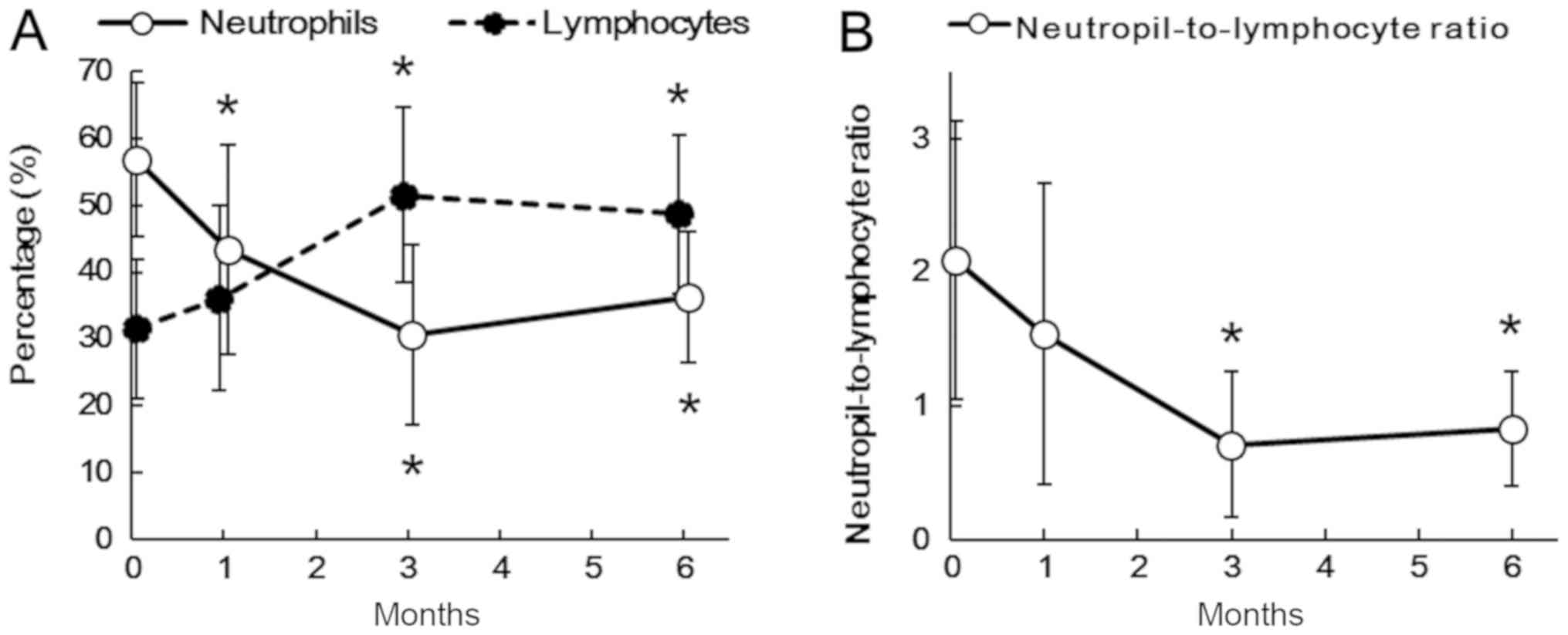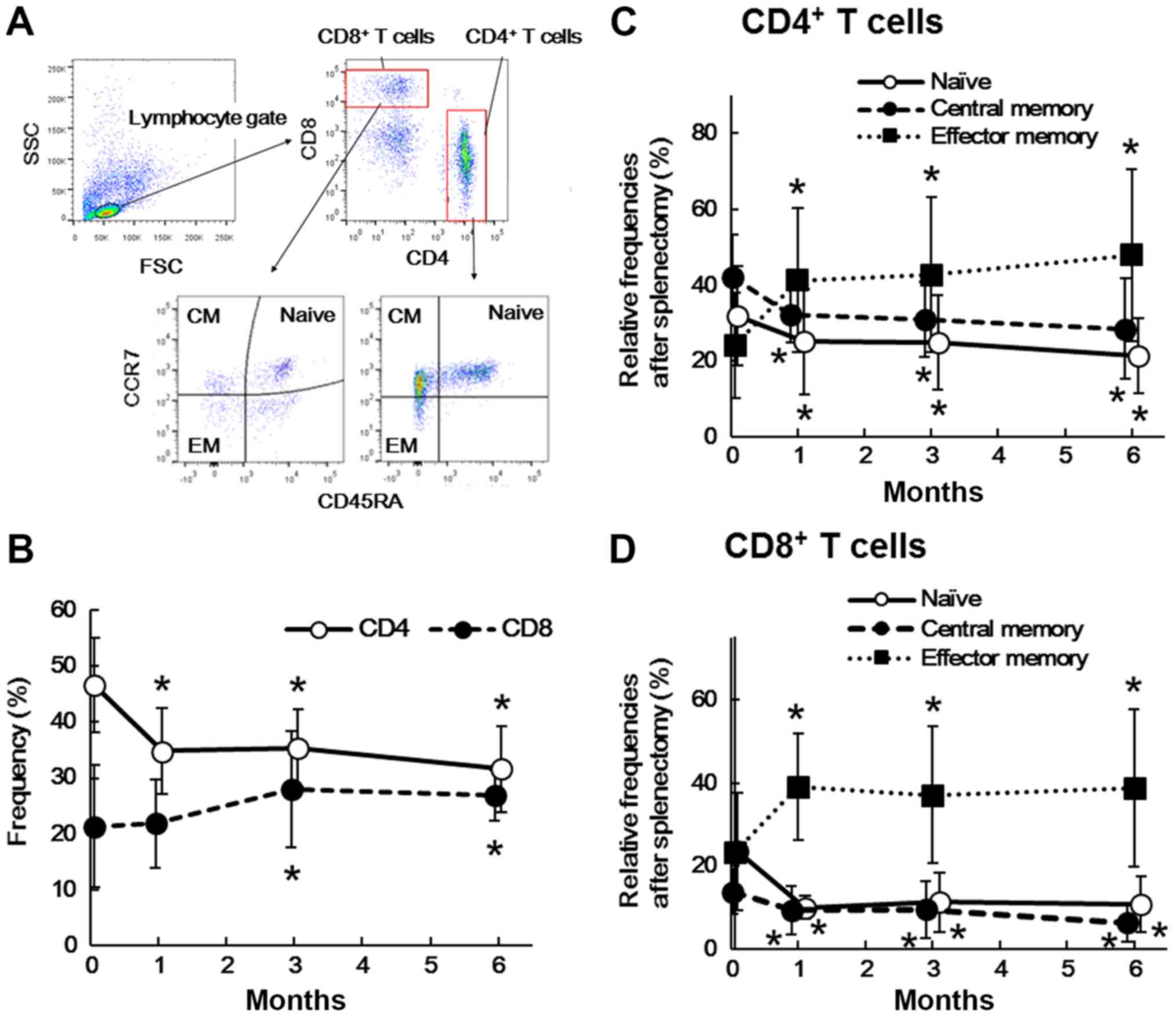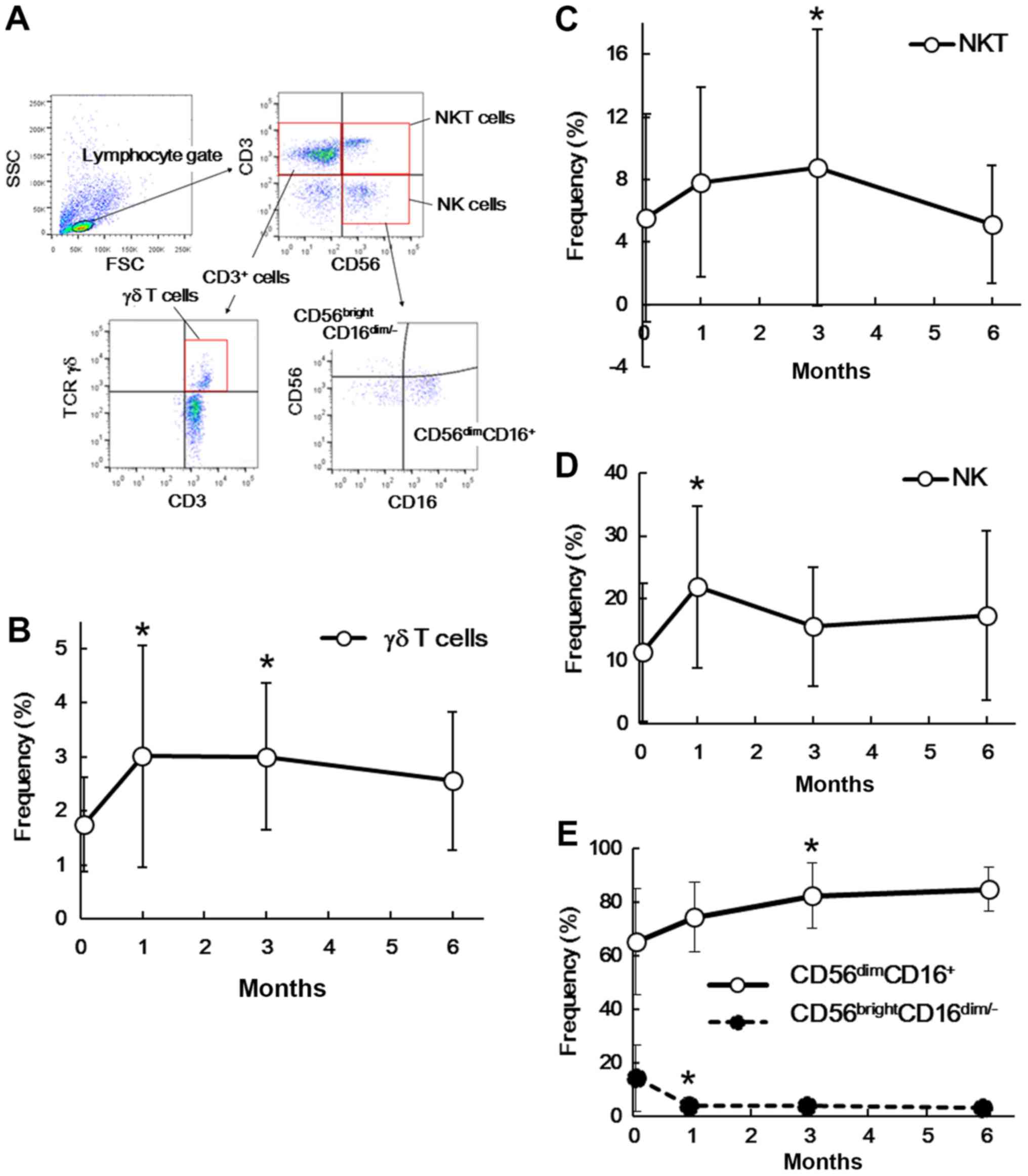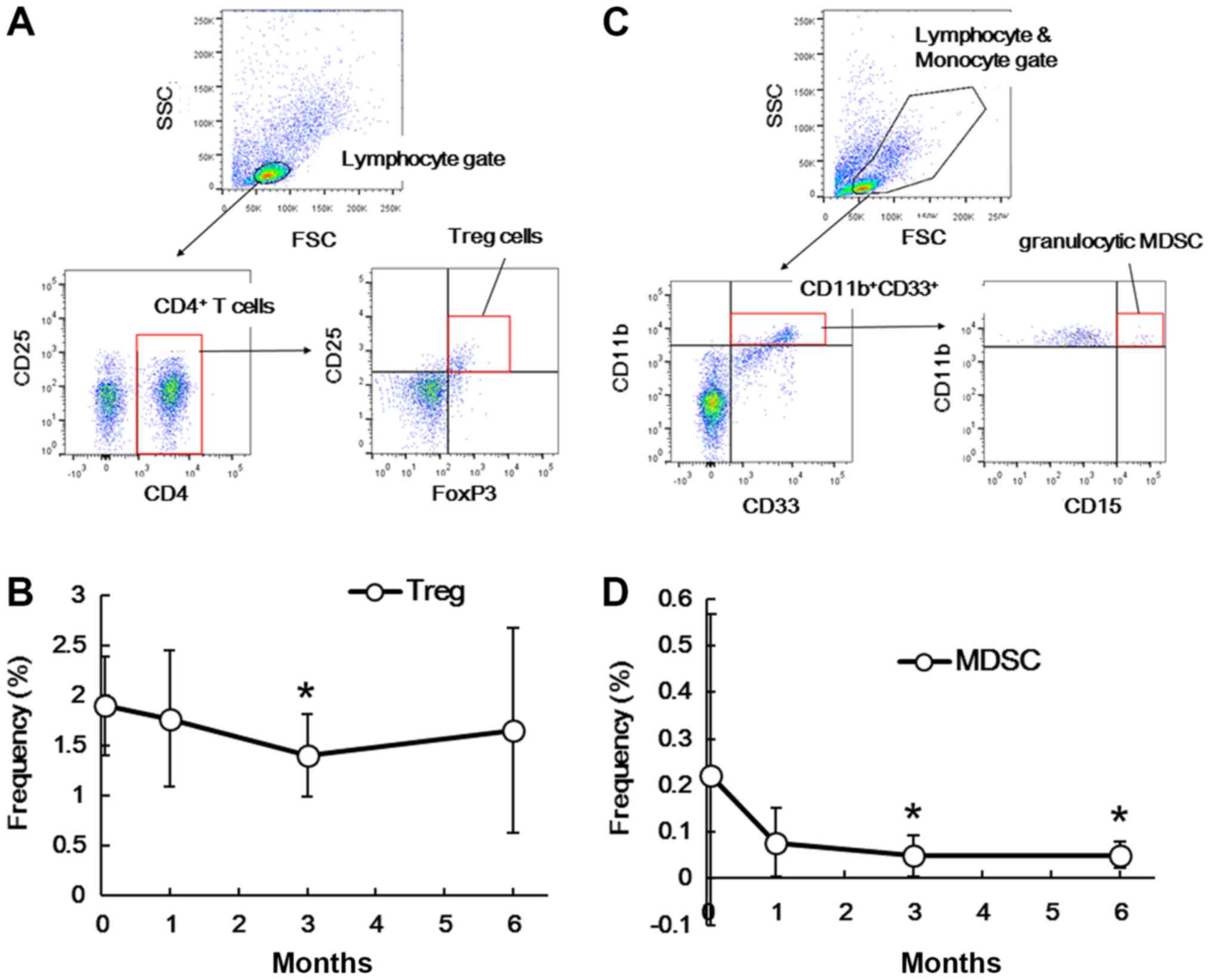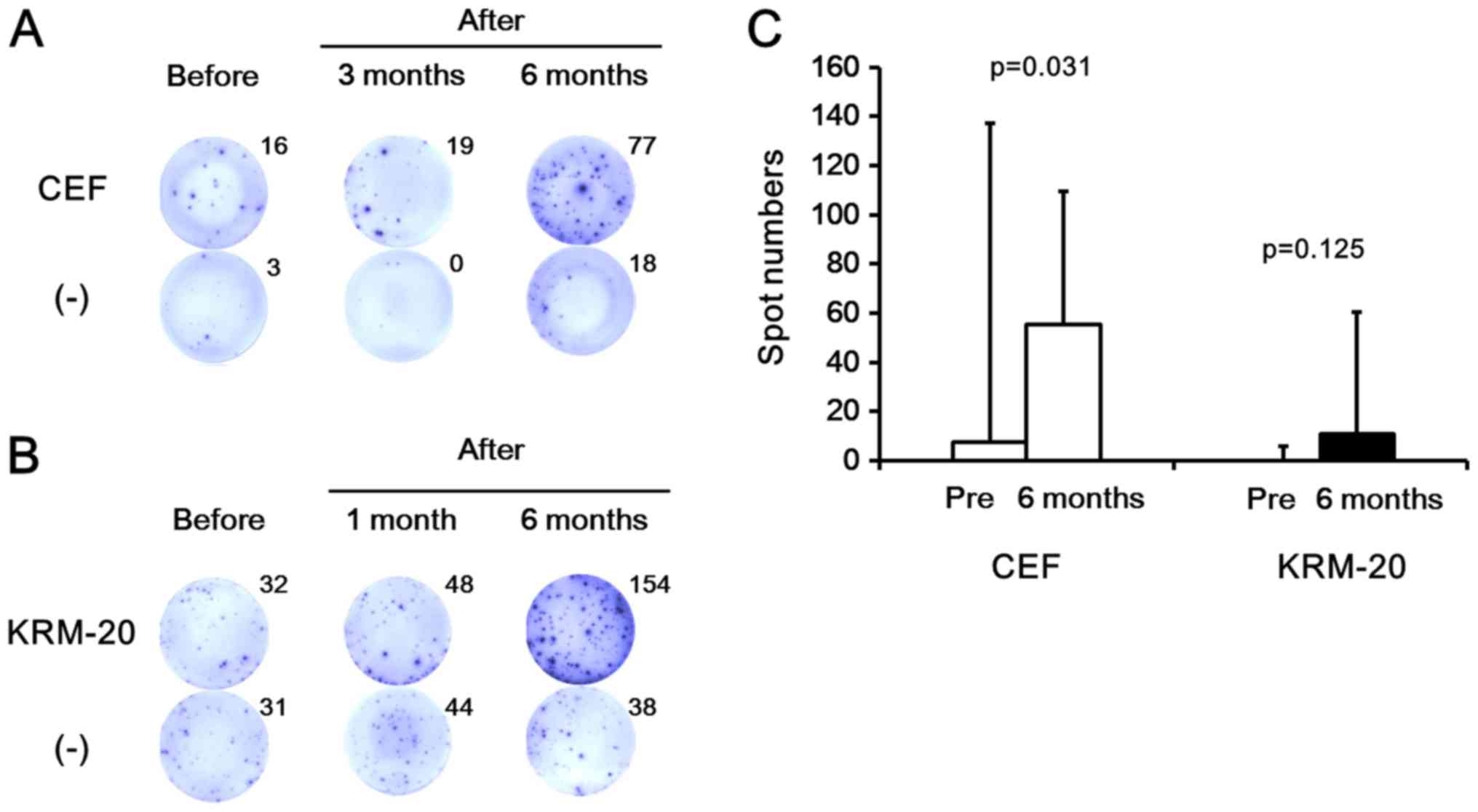|
1
|
Planas R, Ballesté B, Alvarez MA, Rivera
M, Montoliu S, Galeras JA, Santos J, Coll S, Morillas RM and Solà
R: Natural history of decompensated hepatitis C virus-related
cirrhosis. A study of 200 patients. J Hepatol. 40:823–830. 2004.
View Article : Google Scholar : PubMed/NCBI
|
|
2
|
Borzio M, Salerno F, Piantoni L, Cazzaniga
M, Angeli P, Bissoli F, Boccia S, Colloredo-Mels G, Corigliano P,
Fornaciari G, et al: Bacterial infection in patients with advanced
cirrhosis: A multicentre prospective study. Dig Liver Dis.
33:41–48. 2001. View Article : Google Scholar : PubMed/NCBI
|
|
3
|
Nomura Y, Kage M, Ogata T, Kondou R,
Kinoshita H, Ohshima K and Yano H: Influence of splenectomy in
patients with liver cirrhosis and hypersplenism. Hepatol Res.
44:E100–E109. 2014. View Article : Google Scholar : PubMed/NCBI
|
|
4
|
Wada Y, Nakashima O, Kutami R, Yamamoto O
and Kojiro M: Clinicopathological study on hepatocellular carcinoma
with lymphocytic infiltration. Hepatology. 27:407–414. 1998.
View Article : Google Scholar : PubMed/NCBI
|
|
5
|
Okabayashi T and Hanazaki K: Overwhelming
postsplenectomy infection syndrome in adults-a clinically
preventable disease. World J Gastroenterol. 14:176–179. 2008.
View Article : Google Scholar : PubMed/NCBI
|
|
6
|
Kawaguchi T, Kuromatsu R, Ide T, Taniguchi
E, Itou M, Sakata M, Abe M, Sumie S and Sata M: Thrombocytopenia,
an important interfering factor of antiviral therapy and
hepatocellular carcinoma treatment for chronic liver diseases.
Kurume Med J. 56:9–15. 2009. View Article : Google Scholar : PubMed/NCBI
|
|
7
|
Ogata T, Okuda K, Sato T, Hirakawa Y,
Yasunaga M, Horiuchi H, Nomura Y, Kage M, Ide T, Kuromatsu R, et
al: Long-term outcome of splenectomy in advanced cirrhotic patients
with hepatocellular carcinoma and thrombocytopenia. Kurume Med J.
60:37–45. 2013. View Article : Google Scholar : PubMed/NCBI
|
|
8
|
Hashizume M, Tomikawa M, Akahoshi T,
Tanoue K, Gotoh N, Konishi K, Okita K, Tsutsumi N, Shimabukuro R,
Yamaguchi S and Sugimachi K: Laparoscopic splenectomy for portal
hypertension. Hepatogastroenterology. 49:847–852. 2002.PubMed/NCBI
|
|
9
|
Anegawa G, Kawanaka H, Uehara H, Akahoshi
T, Konishi K, Yoshida D, Kinjo N, Hashimoto N, Tomikawa M,
Hashizume M and Maehara Y: Effect of laparoscopic splenectomy on
portal hypertensive gastropathy in cirrhotic patients with portal
hypertension. J Gastroenterol Hepatol. 24:1554–1558. 2009.
View Article : Google Scholar : PubMed/NCBI
|
|
10
|
Hu K, Lei P, Yao Z, Wang C, Wang Q, Xu S,
Xiong Z, Huang H, Xu R, Deng M and Maehara Y: Laparoscopic RFA with
splenectomy for hepatocellular carcinoma. World J Surg Oncol.
14:1962016. View Article : Google Scholar : PubMed/NCBI
|
|
11
|
Yoshizumi T, Taketomi A, Soejima Y,
Ikegami T, Uchiyama H, Kayashima H, Harada N, Yamashita Y, Kawanaka
H, Nishizak T and Maehara Y: The beneficial role of simultaneous
splenectomy in living donor liver transplantation in patients with
small-for-size graft. Transpl Int. 21:833–842. 2008. View Article : Google Scholar : PubMed/NCBI
|
|
12
|
Zhang XY, Li C, Wen TF, Yan LN, Li B, Yang
JY, Wang WT and Jiang L: Synchronous splenectomy and hepatectomy
for patients with hepatocellular carcinoma and hypersplenism: A
casecontrol study. World J Gastroenterol. 21:2358–2366. 2015.
View Article : Google Scholar : PubMed/NCBI
|
|
13
|
Halazun KJ, Hardy MA, Rana AA, Woodland DC
IV, Luyten EJ, Mahadev S, Witkowski P, Siegel AB, BrownRS Jr and
Emond JC: Negative impact of neutrophil-lymphocyte ratio on outcome
after liver transplantation for hepatocellular carcinoma. Ann Surg.
250:141–151. 2009. View Article : Google Scholar : PubMed/NCBI
|
|
14
|
Aino H, Sumie S, Niizeki T, Kuromatsu R,
Tajiri N, Nakano M, Satani M, Okamura S, Shimose S, Miyahara K and
Torimura T: The systemic inflammatory response as a prognostic
factor for advanced hepatocellular carcinoma with extrahepatic
metastasis. Mol Clin Oncol. 5:83–88. 2016. View Article : Google Scholar : PubMed/NCBI
|
|
15
|
Kinjo N, Kawanaka H, Akahoshi T, Tomikawa
M, Yamashita N, Konishi K, Tanoue K, Shirabe K, Hashizume M and
Maehara Y: Risk factors for portal venous thrombosis after
splenectomy in patients with cirrhosis and portal hypertension. Br
J Surg. 97:910–916. 2010. View Article : Google Scholar : PubMed/NCBI
|
|
16
|
Roederer M: Spectral compensation for flow
cytometry: Visualization artifacts, limitations and caveats.
Cytometry. 45:194–205. 2001. View Article : Google Scholar : PubMed/NCBI
|
|
17
|
Dumitru CA, Moses K, Trellakis S, Lang S
and Brandau S: Neutrophils and granulocytic myeloid-derived
suppressor cells: Immunophenotyping, cell biology and clinical
relevance in human oncology. Cancer Immunol Immunother.
61:1155–1167. 2012. View Article : Google Scholar : PubMed/NCBI
|
|
18
|
Noguchi M, Arai G, Matsumoto K, Naito S,
Moriya F, Suekane S, Komatsu N, Matsueda S, Sasada T, Yamada A, et
al: Phase I trial of a cancer vaccine consisting of 20 mixed
peptides in patients with castration-resistant prostate cancer:
Dose-related immune boosting and suppression. Cancer Immunol
Immunother. 64:493–505. 2015. View Article : Google Scholar : PubMed/NCBI
|
|
19
|
Tang H, Li B, Zhang A, Lu W, Xiang C and
Dong J: Prognostic significance of neutrophil-to-lymphocyte ratio
in colorectal liver metastasis: A systematic review and
meta-analysis. PLoS One. 18:e01594472016. View Article : Google Scholar
|
|
20
|
Yang JJ, Hu ZG, Shi WX, Deng T, He SQ and
Yuan SG: Prognostic significance of neutrophil to lymphocyte ratio
in pancreatic cancer: A meta-analysis. World J Gastroenterol.
7:2807–2815. 2015. View Article : Google Scholar
|
|
21
|
Min KW, Kwon MJ, Kim DH, Son BK, Kim EK,
Oh YH and Wi YC: Persistent elevation of postoperative
neutrophil-to-lymphocyte ratio: A better predictor of survival in
gastric cancer than elevated preoperative neutrophil-to-lymphocyte
ratio. Sci Rep. 25:139672017. View Article : Google Scholar
|
|
22
|
Mozos I, Malainer C, Horbańczuk J, Gug C,
Stoian D, Luca CT and Atanasov AG: Inflammatory markers for
arterial stiffness in cardiovascular diseases. Front Immunol.
8:10582017. View Article : Google Scholar : PubMed/NCBI
|
|
23
|
Mueller SN, Gebhardt T, Carbone FR and
Heath WR: Memory T cell subsets, migration patterns and tissue
residence. Annu Rev Immunol. 31:137–161. 2013. View Article : Google Scholar : PubMed/NCBI
|
|
24
|
Groot F, van Capel TM, Schuitemaker J,
Berkhout B and de Jong EC: Differential susceptibility of naïve,
central memory and effector memory T cells to dendritic
cell-mediated HIV-1 transmission. Retrovirology. 3:522006.
View Article : Google Scholar : PubMed/NCBI
|
|
25
|
Ugel S, Peranzoni E, Desantis G, Chioda M,
Walter S, Weinschenk T, Ochando JC, Cabrelle A, Mandruzzato S and
Bronte V: Immune tolerance to tumor antigens occurs in a
specialized environment of the spleen. Cell Rep. 2:628–639. 2012.
View Article : Google Scholar : PubMed/NCBI
|
|
26
|
Levy L, Mishalian I, Bayuch R, Zolotarov
L, Michaeli J and Fridlender ZG: Splenectomy inhibits non-small
cell lung cancer growth by modulating anti-tumor adaptive and
innate immune response. Oncoimmunology. 4:e9984692015. View Article : Google Scholar : PubMed/NCBI
|
|
27
|
Hashimoto N, Shimoda S, Kawanaka H,
Tsuneyama K, Uehara H, Akahoshi T, Kinjo N, Taketomi A, Shirabe K,
Akashi K, et al: Modulation of CD4+ T cell responses following
splenectomy in hepatitis C virus-related liver cirrhosis. Clin Exp
Immunol. 165:243–250. 2011. View Article : Google Scholar : PubMed/NCBI
|
|
28
|
Sumida K, Shimoda S, Iwasaka S, Hisamoto
S, Kawanaka H, Akahoshi T, Ikegami T, Shirabe K, Shimono N, Maehara
Y, et al: Characteristics of splenic CD8+ T cell exhaustion in
patients with hepatitis C. Clin Exp Immunol. 174:172–178. 2013.
View Article : Google Scholar : PubMed/NCBI
|
|
29
|
Lindau D, Gielen P, Kroesen M, Wesseling P
and Adema GJ: The immunosuppressive tumour network: Myeloid-derived
suppressor cells, regulatory T cells and natural killer T cells.
Immunology. 138:105–115. 2013. View Article : Google Scholar : PubMed/NCBI
|
|
30
|
Mizukoshi E, Yamashita T, Arai K,
Terashima T, Kitahara M, Nakagawa H, Iida N, Fushimi K and Kaneko
S: Myeloid-derived suppressor cells correlate with patient outcomes
in hepatic arterial infusion chemotherapy for hepatocellular
carcinoma. Cancer Immunol Immunother. 65:715–725. 2016. View Article : Google Scholar : PubMed/NCBI
|
|
31
|
Long X, Wang J, Zhao JP, Liang HF, Zhu P,
Cheng Q, Chen Q, Wu YH, Zhang ZG, Zhang BX and Chen XP: Splenectomy
suppresses growth and metastasis of hepatocellular carcinoma
through decreasing myeloid-derived suppressor cells in vivo. J
Huazhong Univ Sci Technolog Med Sci. 36:667–676. 2016. View Article : Google Scholar : PubMed/NCBI
|
|
32
|
Huang CH, Jeng WJ, Ho YP, Teng W, Chen WT,
Chen YC, Lin SM, Chiu CT, Sheen IS and Lin CY: Increased regulatory
T cells in patients with liver cirrhosis correlated with
hyperbilirubinemia and predict bacterial complications. J
Gastroenterol Hepatol. 30:775–783. 2015. View Article : Google Scholar : PubMed/NCBI
|
|
33
|
Nagai H, Mukouzu T, Matsui D, Kanekawa T,
Matsui T, Kanayama M, Wakui N, Momiyama K, Shinohara M, Ishii K, et
al: Host Immunity influences the efficacy of combined
intra-arterial chemotherapy for advanced hepatocellular carcinoma
in liver cirrhosis patients. Hepatogastroenterology. 61:741–746.
2014.PubMed/NCBI
|
|
34
|
Romano A, Hou X, Sertorio M, Dessein H,
Cabantous S, Oliveira P, Li J, Oyegue S, Arnaud V, Luo X, et al:
Foxp3+regulatory T cells in hepatic fibrosis and splenomegaly
caused by schistosoma japonicum: The spleen may be a major source
of tregs in subjects with splenomegaly. PLoS Negl Trop Dis.
10:e00043062016. View Article : Google Scholar : PubMed/NCBI
|
|
35
|
Bedard M, Salio M and Cerundolo V:
Harnessing the power of invariant natural killer T cells in cancer
immunotherapy. Front Immunol. 18:18292017. View Article : Google Scholar
|
|
36
|
Sekiguchi T, Nagamine T, Takagi H and Mori
M: Reduction of virus burden-induced splenectomy in patients with
liver cirrhosis related to hepatitis C virus infection. World J
Gastroenterol. 7:2089–2094. 2006. View Article : Google Scholar
|
|
37
|
Kawarabayashi N, Seki S, Hatsuse K, Ohkawa
T, Koike Y, Aihara T, Habu Y, Nakagawa R, Ami K, Hiraide H and
Mochizuki H: Decrease of CD56(+)T cells and natural killer cells in
cirrhotic livers with hepatitis C may be involved in their
susceptibility to hepatocellular carcinoma. Hepatology. 32:962–969.
2000. View Article : Google Scholar : PubMed/NCBI
|
|
38
|
Yang CM, Yoon JC, Park JH and Lee JM:
Hepatitis C virus impairs natural killer cell activity via viral
serine protease NS3. PLoS One. 14:e01757932017. View Article : Google Scholar
|
|
39
|
Poli A, Michel T, Thérésine M, Andrès E,
Hentges F and Zimmer J: CD56bright natural killer (NK) cells: An
important NK cell subset. Immunology. 126:458–465. 2009. View Article : Google Scholar : PubMed/NCBI
|
|
40
|
Wang J, Han W, Gao Z, Wang Y, Wu L, Zhang
J, Lai W and Wang Z: Elevation of CD16+CD56+
NK-cells and down-regulation of serum interleukin-21 (IL-21) and
IL-1α after splenectomy in relapsed hemophagocytic
lymphohistiocytosis of unknown cause. Hematology. 22:477–483.
2017.PubMed/NCBI
|
|
41
|
Goh CC, Roggerson KM, Lee HC, Golden-Mason
L, Rosen HR and Hahn YS: Hepatitis C virus-induced myeloid-derived
suppressor cells suppress NK cell IFN-γ production by altering
cellular metabolism via arginase-1. J Immunol. 196:2283–2292. 2016.
View Article : Google Scholar : PubMed/NCBI
|
|
42
|
Kawaguchi T, Komori A, Seike M, Fujiyama
S, Watanabe H, Tanaka M, Sakisaka S, Nakamuta M, Sasaki Y, Oketani
M, et al: Efficacy and safety of eltrombopag in Japanese patients
with chronic liver disease and thrombocytopenia: A randomized,
open-label, phase II study. J Gastroenterol. 47:1342–1351. 2012.
View Article : Google Scholar : PubMed/NCBI
|
|
43
|
Sakamaki A, Watanabe T, Abe S, Kamimura K,
Tsuchiya A, Takamura M, Kawai H, Yamagiwa S and Terai S:
Lusutrombopag increases hematocytes in a compensated liver
cirrhosis patient. Clin J Gastroenterol. 10:261–264. 2017.
View Article : Google Scholar : PubMed/NCBI
|
|
44
|
Matsukiyo Y, Nagai H, Matsui T and
Igarashi Y: Host immunological effects of partial splenic
embolization in patients with liver cirrhosis. J Immunol Res.
2018:17463912018. View Article : Google Scholar : PubMed/NCBI
|
|
45
|
Santegoets SJ, Dijkgraaf EM, Battaglia A,
Beckhove P, Britten CM, Gallimore A, Godkin A, Gouttefangeas C, de
Gruijl TD, Koenen HJ, et al: Monitoring regulatory T cells in
clinical samples: Consensus on an essential marker set and gating
strategy for regulatory T cell analysis by flow cytometry. Cancer
Immunol Immunother. 64:1271–1286. 2015. View Article : Google Scholar : PubMed/NCBI
|















